Taking back control - a 'people's vote' and indyref2
- Published
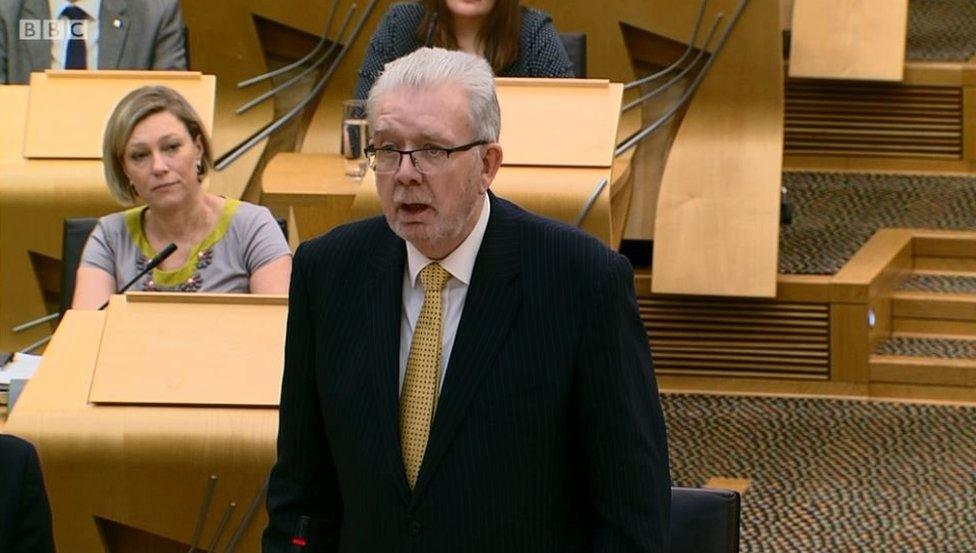
Mike Russell accused Theresa May of talking "mince"
Mike Russell, the Cabinet Secretary for Mitigating Brexit, has an elegant turn of phrase. For example, instead of simply referring to the Commons and its circumlocutions on Brexit, he summoned up an image of the "crumbling palace" by the Thames.
But, in these troubled times, one must occasionally revert to the demotic. And thus it was that he characterised the current stance of the prime minister as "self-deluding mince".
He deployed that particular phrase with regard to the prospect that the EU might now crumble and transform the deal it had negotiated with the UK. It was, he said, "arrogance born of ignorance".
Mr Russell was delivering a statement to Holyrood re the aftermath of the PM's Westminster defeat. He began with a little history lesson, reflecting that five years ago the UK Government had published a study paper arguing that Scotland's place in the EU was secured - and could only be secured - through remaining in the UK.
How, he noted, things have changed. Scotland, he said, was now "imminently threatened" with being taken out of the EU against the declared will of her people.
And so, of course, he went on to announce plans for an immediate referendum on Scottish independence, didn't he? What's that?
But if it wasn't in the statement - and it wasn't - perhaps he might seize the opportunity presented by Patrick Harvie of the Greens, a fellow supporter of independence.
Mr Harvie said that one could "hardly wish for a better advertisement" for independence than the "shambolic" events at Westminster of the last few days, weeks and months.
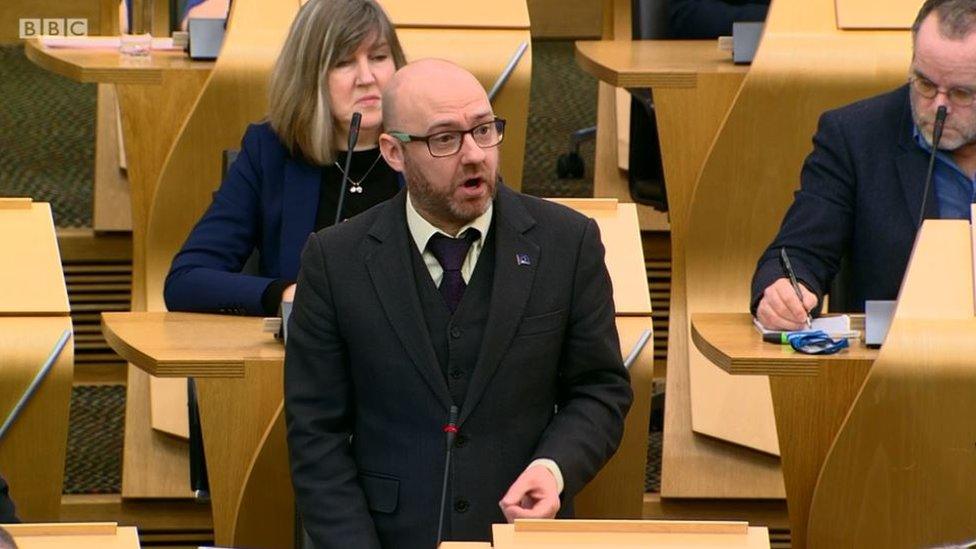
Patrick Harvie said Brexit was becoming a great advert for Scottish independence
As you might expect, Mr Russell agreed. But still no timetable for indyref2. No declaration, even, of an intent to broach the topic with the prime minister.
There is, of course, a very good reason for this. The SNP's offer of independence is predicated upon confidence, not fear or flight.
It is founded upon the prospectus that the ancient nation of Scotland could, to borrow a phrase, "take back control" of politics as a whole, having demonstrated sufficient governmental capacity during the two decades of devolution.
It is suggested that independence is a natural process, an evolution, in which Scotland would embark upon the glad confident morning of full self-government, while maintaining relations with other European nations, including England.
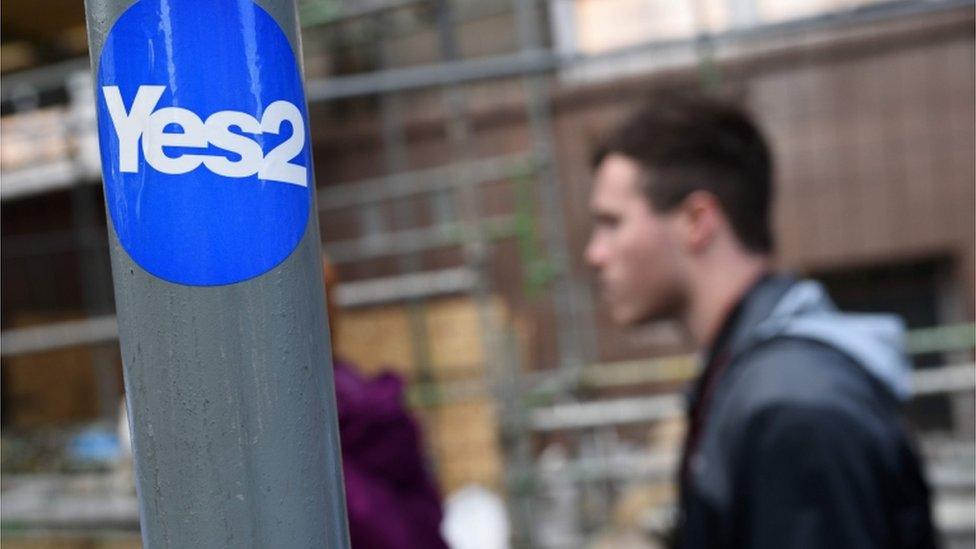
For modern Nationalists, like Mike Russell and Nicola Sturgeon, it is not about escaping tyranny or despotism. It is not about escape at all.
It is about giving the people of Scotland the assurance that they can govern themselves - and, crucially, do so in cohort with their allies and neighbours.
The Brexit process is not at an end. Not by any means. But it is certainly the case that the current unravelling of that process has created despondency and disquiet among the populace, perhaps regardless of their principled stance on the question.
Folk are upset. Folk are fretful. They are concerned, anxious.
That is why Nicola Sturgeon continues to say that her further thoughts on an independence referendum will only emerge when there is a degree of clarity about Brexit.
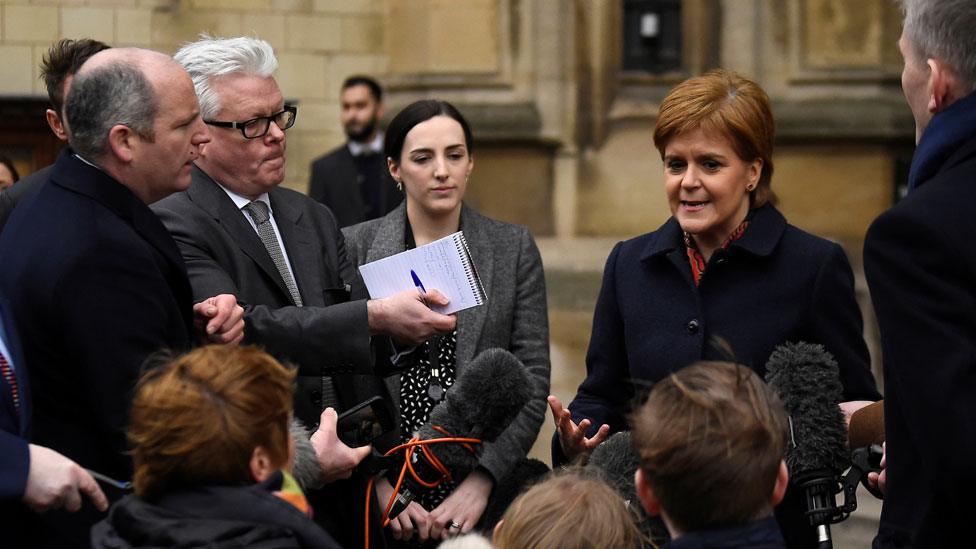
Nicola Sturgeon is in London for talks with her SNP MPs - and the media
Plus there is the small matter of Westminster consent. The PM has repeatedly said that "now is not the time" for an independence ballot. I doubt she has changed her mind on that in the light of recent events.
Now you will hear Conservatives say that the SNP glories in the chaos of the Brexit process, that its leaders perceive an opportunity. Scots Tory MPs were making that case rather forcefully on the wireless this morning.
It is, if you like, the Harvie diagnosis. There is a degree of truth in it. It is arguable that Tory disarray equals an SNP chance. But I do not believe it is anything like the full story.
If that were the case, then Ms Sturgeon would have demanded a referendum already. She would have revived her earlier call for the power to hold indyref2 - a call she shelved after the SNP palpably lost ground in the last UK general election.
She holds off because she suspects that the people of Scotland are already distressed enough over constitutional manoeuvring and might not immediately welcome a further, Scottish-born bout, however much that might be depicted as a solution to the pre-existing problem.
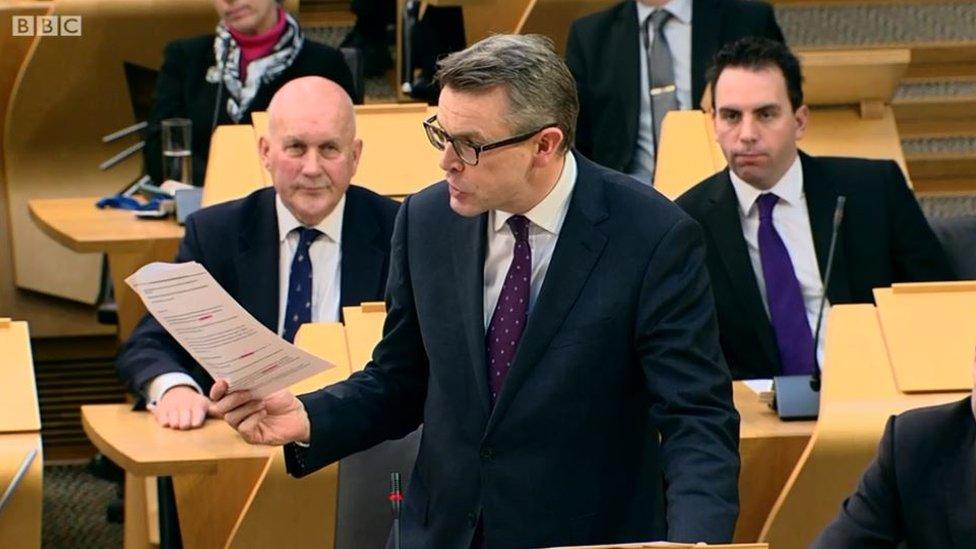
Adam Tomkins said opponents of Mrs May's deal were risking the UK leaving without any deal
So where are we on Brexit more generally? The scale of the defeat, self-evidently, points to significant opposition to the PM's deal. To put it mildly.
The options now are limited. One is leaving with no agreed deal. Mr Russell excoriated that and suggested it should be excluded from discourse by UK government diktat.
In response, Adam Tomkins said that those who were facilitating no deal were those who voted against the PM. Cue a vigorous bout of Tory finger-jabbing. Mr Russell reminded him that three times as many Tories as SNP MPs voted against the PM.
Still, No Deal may arrive upon us. As things stand, if there is not a settlement, the UK departs the EU on 29 March. Like Yeats' rough beast, some see us slouching towards that eventuality. To be clear, some say it should be seized eagerly as an opportunity.
Or there may be a revised settlement - either under Theresa May or her successor. The EU will be very hard to shift but they are pragmatists.
The scope of the Commons defeat will have appalled EU leaders, but it may cajole them too. Although, as I noted on the wireless this morning, the UK's leverage is limited because we are leaving the club, surrendering any counter-balancing threats which we might have otherwise issued.
There may be a general election, depending on the outcome of tonight's vote. But, to be clear, that would not, in itself, provide a solution to the Brexit dilemma. The new government, of whatever colour, would require to find that separately.
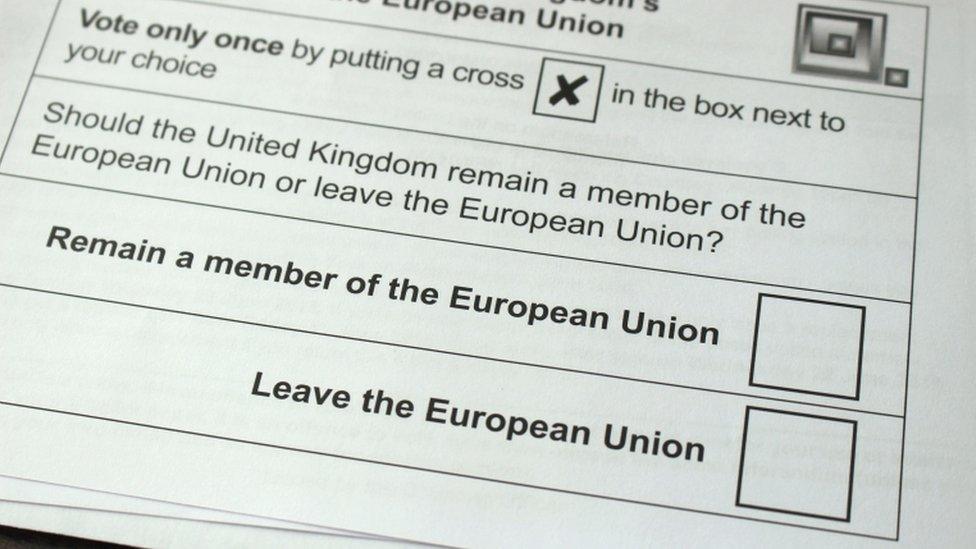
What might the question be if there were a second EU referendum?
Or there may be a further EU referendum. Alex Neil of the SNP put his finger on a quandary with that. Mr Neil is pro-Brexit and worries about the precedent for independence of a further EU plebiscite - but he is also an exceptionally astute reader of politics.
What, he said, would the question be in such a plebiscite? He has a point.
Would it be Remain v Leave? Arguably, that would take us no further forward, especially if the outcome were Leave. Again. Leave on which terms?
How about Remain v No Deal departure? Snag is that very few in the Commons actually support No Deal, as opposed to warning / anticipating that it might happen.
Should it then be Remain v the PM's deal? Perhaps. Arguably, if the Commons ordered such a vote, then MPs would be mandated to accept the outcome, including the PM's terms which they have just condemned by a large majority.
The ceremony of innocence is drowned.